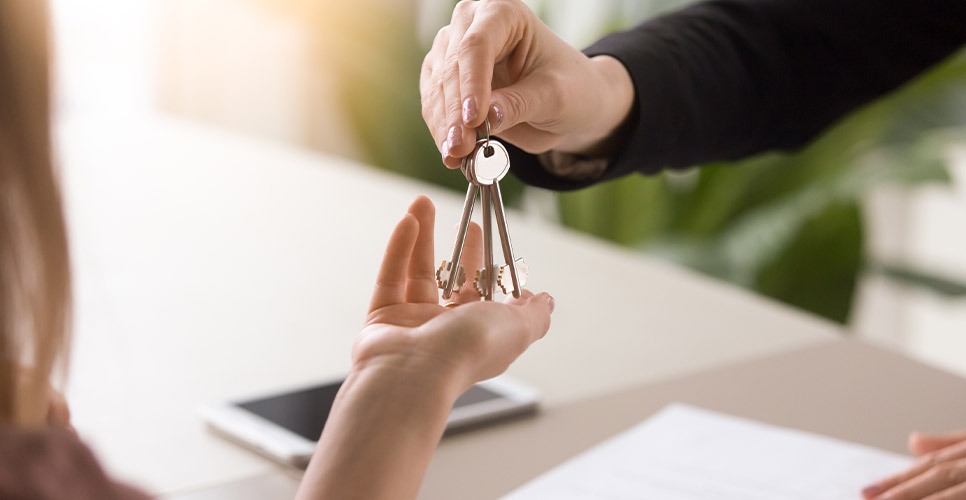Sales

If you have decided to buy a home then you now have lots of factors to consider. Where do I want to live? What can I afford? What type of property will suit me best? Where do I get my mortgage? Which solicitor or conveyancer will I use? Will I need to organise a survey?
We have been helping buyers make these choices since 1993 and as we mostly deal with properties in Wellingborough and the surrounding villages, we know the area well and have the experience to deal with any issues as they come up.
We won’t pretend that buying a home can’t sometimes be stressful, but by understanding the buying process and making proper plans, you can minimise the pressures that you otherwise may face. We will always try to find you a property that you will want to make your home. We will listen to what you need, we will offer our advice when we think it may help, we won't pressurise you into making an offer before you are ready and we will always try to be open and honest in our dealings with you. We will always try to use our experience to show you the right home and to give you any help you may need to make the process as smooth as possible.
The Wellingborough area is very popular with potential homebuyers. There is a good range of properties and whether you need a flat, traditional terrace, bungalow, modern house or a home in a village then we can probably help.
Prices in the Wellingborough area are generally more affordable than nearby Northampton and our train service to London is better (regular Midland Mainline commuter service to London St Pancras in about 55 minutes). Good road links (A14, A45 & M1) and a central position within the UK make this a very convenient and attractive area to set up home.
If you settle on this area as the place to live then get in touch with us and we’ll take the details of what you’re searching for. We’ll talk to you to establish what your needs are and to make sure that we understand your requirements. We will then send you details of any suitable properties that we are currently marketing and will keep in contact with information about new properties as they become available.You can also see all of our properties on this website which we update every day.
If you want to put yourself in the best potential buying position then we suggest that you make some provisional mortgage arrangements before you start to view properties. It will be easier for you to make a decision if you already know what you can borrow and which lender you will be going to. It will also mean that the seller will be more likely to consider any offer you make if it is clear that you have done your homework and have your financial arrangements in place.

When you have decided which of our properties seem interesting then let us know and we can arrange to show you around.
We have keys to a large number of our properties although others may require us making you an appointment with the seller. We will always try to fit in with your suggested viewing times but please try to be flexible if you can. It is helpful if you can give us a couple of suggested times when you will be available (...trying to get a busy seller with hectic working hours home for a 5pm viewing isn’t always possible).
Whilst we will normally show you around the property ourselves (often with the seller present but in the background ready to answer specific questions), some sellers prefer to show you around themselves. We will advise you of the actual arrangements when we confirm your appointment. Depending upon the size of the property, we suggest that most first viewings are fairly short, taking no more than about 15 to 20 minutes at the most. If you then want to revisit your "favourite" for a much longer, more detailed 2nd viewing then we would be happy to arrange that.
If you see a home that you like then let us know and we will be pleased to put your offer forward to the seller.
Please be realistic with your expectations of what the seller may accept as offers considerably below the asking price are rarely acceptable. However, that said, we submit all offers received to the seller for consideration and confirm them in writing.
Most people that place offers do so verbally and we wouldn’t normally need you to confirm an offer in writing. Whilst you are not “legally bound” at this stage, we would ask that you do not submit an offer unless you genuinely intend to buy the property. In turn we will not ask you for a deposit or any other fee (unless the property is brand new in which case you may need to pay a reservation fee or deposit that is then passed to the builder).
When making an offer we ask that a customer confirms their finance at the time of making an offer.
If your offer is accepted then we will normally mark the property as “Sale Agreed” and will ask the seller to allow us to suspend further viewings from other potential buyers. We do not encourage “gazumping” and will always tell a seller to think very carefully before pulling out of a sale on the promise of more money from an alternative potential buyer.
However, please be aware that, by law, we have to advise the seller of all offers received up to the point that contracts are exchanged and, irrespective of our views, the seller is quite entitled to change buyers if he/she so wishes.
As soon as your offer is accepted we will need to know the details of the solicitor or conveyancer that you will be appointing and we will require you to provide us with documentation proving your identity. We will not be able to progress any transaction until this information has been received from you. From our experience, delays in dealing quickly with these issues can add weeks to the overall time that the transaction will take.
If you need to get a mortgage in order to buy a home then you have a choice of going directly to a mortgage lender such as your bank or building society or you can go to a mortgage broker. Either way, you will be advised of what you can borrow and what your monthly mortgage repayments are likely to be.
We suggest that an appointment with a mortgage broker is normally a good choice as you are then likely to be offered a far wider choice of products from competing lenders.
Once a formal mortgage application has been submitted to your lender they will normally take up references with your employer, carry out credit checks and often send out a surveyor to carry out an inspection of the property to make sure that it is suitable as security for the loan that you need. When your lender is happy with your credit checks, references and has verified the value of the property that you are buying, they will then post or email a copy of the formal mortgage offer to both yourself and your solicitor.

When you buy a property and need a mortgage, most lenders will send a surveyor to look over the property. This is known as a mortgage valuation. It is designed to advise the lender if the property is suitable as security for the mortgage; basically, if you didn’t pay the mortgage repayments, would the lender be able to repossess the house and resell it to get their money back.
Whilst most, but not all, lenders will send the buyer a copy of the mortgage valuation report, it is only a basic form.
If you want to have a more in-depth survey carried out on the property that you intend to buy then you will need to instruct an independent surveyor to inspect the property for you. If you are paying cash for the property that you are buying then your solicitor will undoubtedly advise you to obtain an independent survey.
Whilst we are Chartered Surveyors, we can’t do a survey on a house that we are selling due to a potential conflict of interest. We can however recommend other surveyors who would undertake a report for you.
Most firms of surveyors have a range of different reports that will go into varying degrees of depth. Most buyers who have an independent survey done opt for a report known as a Homebuyers Survey & Valuation. This will give you all of the basic information that you are likely to need.
The thing to remember when reading any survey report is that the surveyor is not setting out to make the property look good but rather to cover all of the relevant potential bad point! When you get your survey report back we suggest that you re-visit the property so that you can see any potential problems for yourself. Problems are often never as bad as they seem on paper.
The legal work that will be done on your behalf will be undertaken by either a solicitor or conveyancer. You are responsible for their charges and costs and so often it is tempting to go with a “cheap quote”. A word of warning: - a lot of firms that offer cheaper conveyancing are call-centre based and as a result you can often expect the usual frustrations in getting hold of the individual or team dealing with your work.
If you are tempted to go with a lower quote then its always worth talking to us first to see what are experience is of the firm that you intend to instruct.
Our criteria in recommending a law firm is based on our day-to-day experiences with them. We think that a good solicitor should be pro-active, competent, accessible and should keep you up to date, with things explained in clear, everyday language. We also believe that a local company is better as you can meet face-to face if necessary, drop in documents etc.
We would be happy to recommend several local solicitors who we feel would offer you a good level of service at a reasonable fee. Please talk to us if this would be helpful.
The solicitor or conveyancer that you choose will find out as much as they can about the legal position with the property that you intend to buy.
The seller’s solicitor will send them a document known as a Draft Contract; this will specify the property that you are buying, the price agreed and other specific matters relating to the transaction. Your solicitor should also receive a Sellers Property Information Form that will have been completed by the seller and this will give details of alterations to the property, any disputes with neighbours and a whole host of other points.
Your solicitor will then raise Preliminary Enquiries, which are a number of questions asking about the property covering the seller’s use and experience of living there. These will be sent to the seller’s solicitor to be answered. Your solicitor may require alterations to be made to the Draft Contract in order to protect your legal position or clarify points more accurately.
You law firm will also carry out a number of searches with the local council, water authority and special environmental data companies to establish. These are designed to find out about any planning permissions or building regulation notices that affect the property, the position with roads and sewers, previous use of the land on which the property is built etc.
Once the contract terms have been settled, the search results have been obtained and a copy of your mortgage offer has been received, then your solicitor will report their findings to you. Once you are satisfied with the legal position you will then be asked to sign the contract in readiness for there to be an Exchange of Contracts.

This is a major milestone as Exchange of Contracts is the point at which the transaction becomes legally binding. It is also the point at which the completion (moving) date is confirmed.
Depending on the complexity of your purchase and the position of other people within any "chain" of related properties, it can take anything from just a few weeks to several months to get to this stage. The solicitor acting for you will normally need a deposit from you before being able to exchange contracts. This will
need to be cleared onto your solicitor’s account before exchange and so if you are paying a personal cheque then you will need to allow plenty of time for your cheque to clear. Increasingly, we find that buyers will arrange direct transfers of funds via their bank to avoid such delays.
The deposit that you will be asked to provide will traditionally be 10% of the purchase price but often your solicitor will negotiate on your behalf in order to agree a lower amount. About 5% seems to be common now with first purchases. If you are selling a property and buying then it is likely that the deposit that is used to secure your purchase will have come from the buyer below you in the chain. Once contracts are exchanged, your solicitor will arrange with your lender to have the mortgage funds sent to their client account so that the money is ready to be paid to the seller’s solicitors on the day of completion.
When you have exchanged contracts on your purchase you will need to notify the various utility suppliers of the date that you are moving in. This will allow them to transfer gas, electricity, water & telephone services etc into your name. You should also remember to make arrangement to have you mail re-directed, sort out your TV licence etc.
We strongly advise that when you move in you take a note of all meter readings and keep a record safely as we are aware that certain utility companies regularly “lose” meter readings!

Completion Day is the day on which the ownership of the property passes to you. During the morning of completion day your solicitor will transfer the purchase money to the seller’s solicitors’ bank usually by means of a telegraphic transfer. Once the seller's solicitors get confirmation from their bank that the money has been received, they will then contact us, giving us authority to release the keys to you. This normally happens between late morning and early afternoon but can be earlier or later depending upon how quickly your solicitor forwards the money.
You can then come to our office to collect the keys and move in.
Any recommendations that we may make to use a solicitor, conveyancer, removal company, house clearance company, mortgage advisor or similar businesses is based solely on our own experiences of the level of service that any such business normally provides.
We do not receive any referral fees or have any other inducement arrangement in place that influences us in making the recommendations that we do. In short, we recommend on merit.